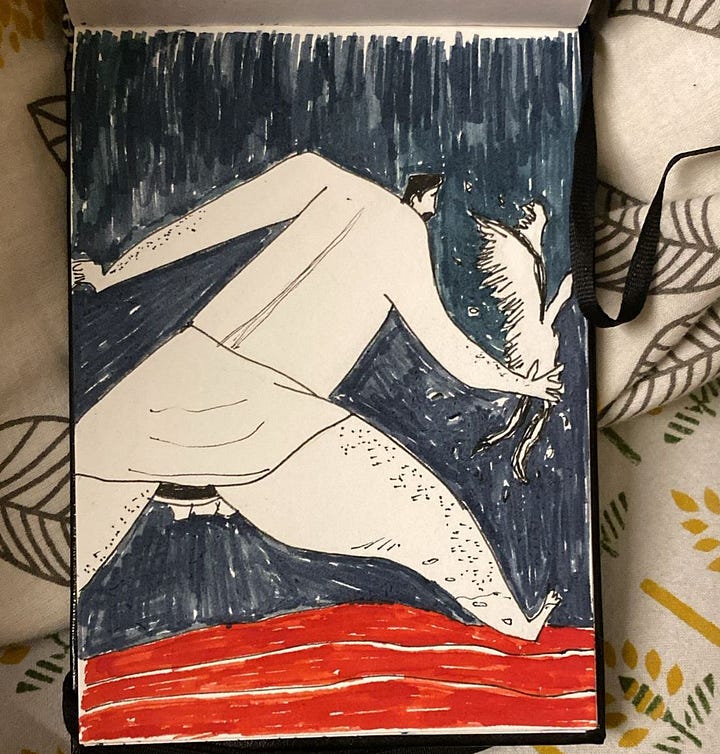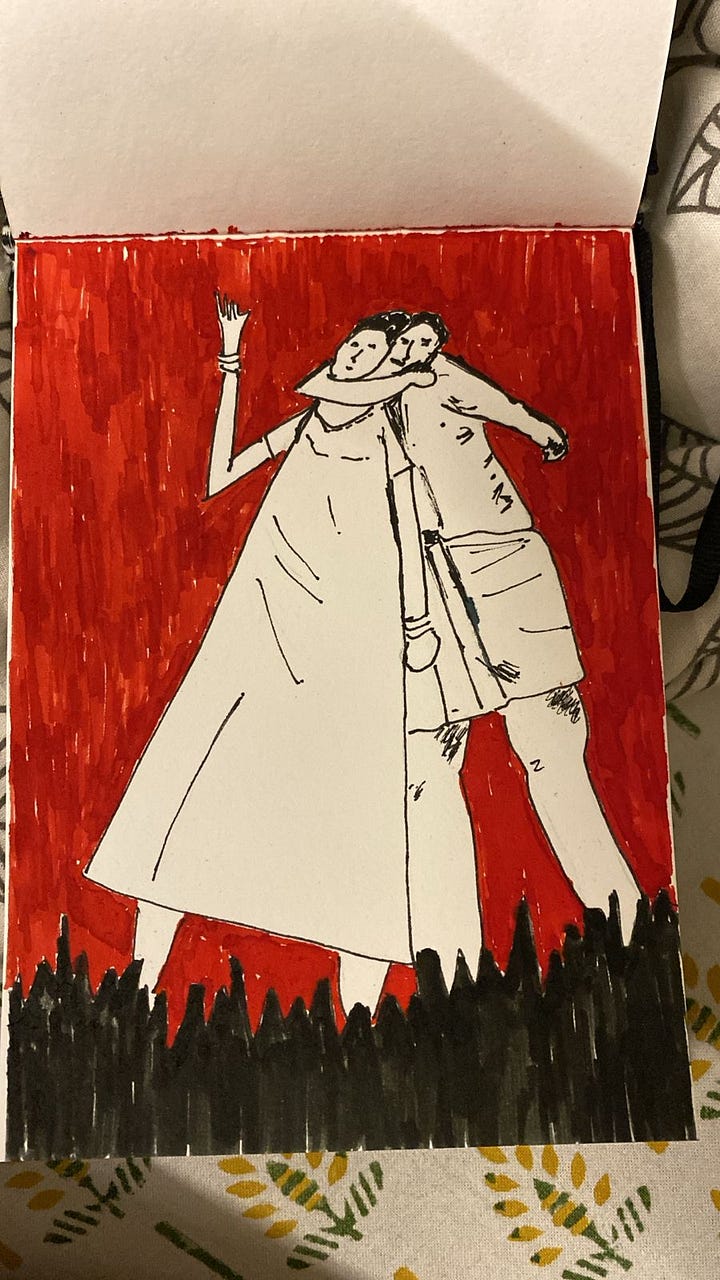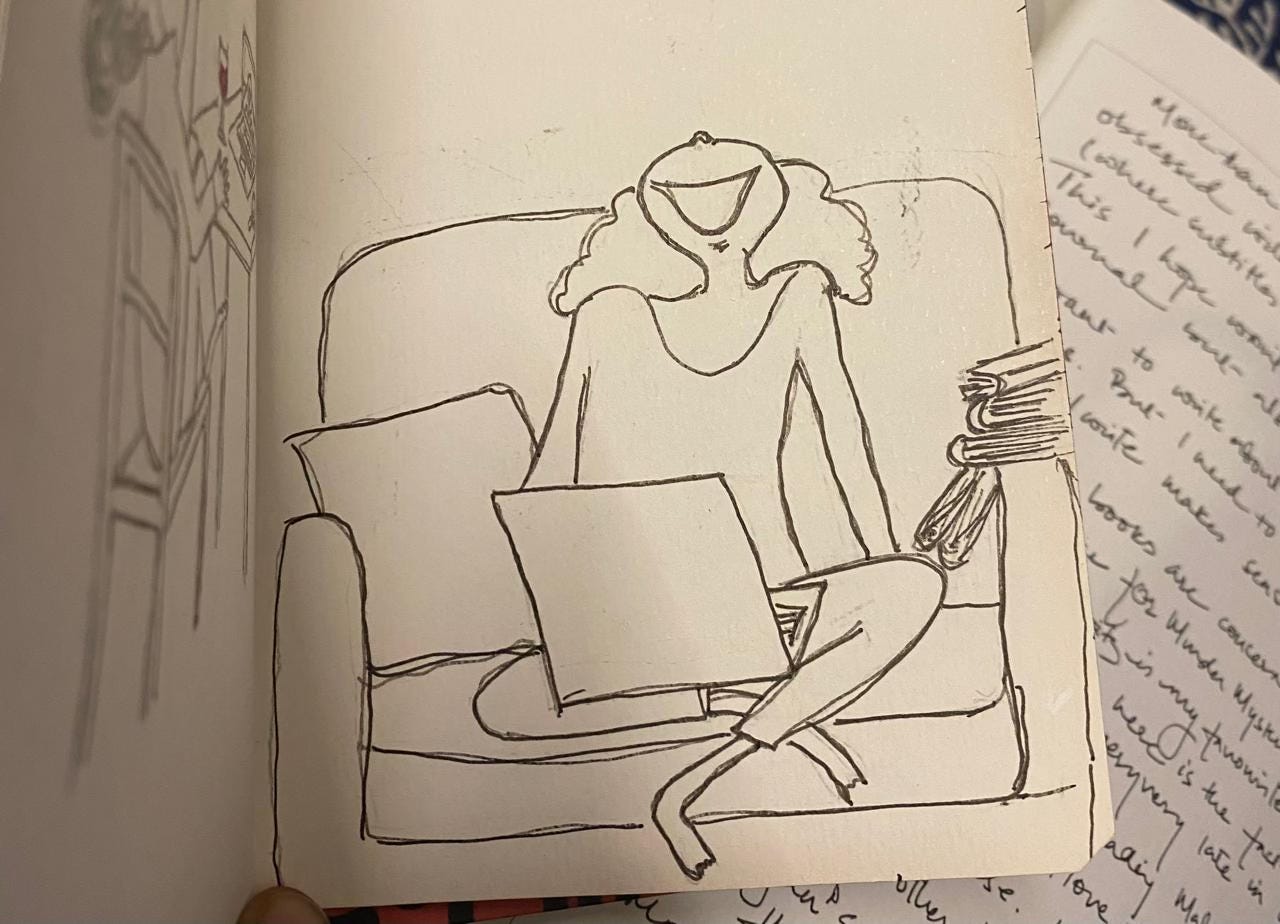Friday Talkies: The Man With Gold
I racked my brain for months on why a Bihari should write on Malayalam films. But I love Mallu films. And cinema and love have no language, alle! So here's Ponman for you.
I am chuffed. I am smiling (at nothing, really). I am doing a little dance in my head. A non-stop jig.
It is April 9th and the movies are back in the cinemas. To be precise —My Mallu Films Are Back In The Theatre Near Me.
The movies had stopped screening for nearly a month (it felt like forever), I am guessing—and this is where I go all conspiracy theorist— in anticipation of Mohanlal’s Empuraan (which by the way I watched in Kochi). Udit had a simpler reason—they need time to churn out movies.
I also thought, and THIS is a little convoluted, that because I hadn’t completed my Ponman piece for Substack (the one you are about to read), this was God’s way of punishing me.
Kartaave, the guilt! Anyhow. There are three releases this weekend. I guess I was waiting for the Gods to blink first1. Now that they have, I think I owe them one.
Toh ab yeh jaisa bhi hai, ye mera hai! (And apologies in advance)
PONMAN (Beware of spoilers, I think)
To begin with, it is safe to say that Ponman is a sleeper hit. Not like Manjummel Boys but in its own quiet way. The acting is stellar. The movie gives you the bare facts. It doesn’t dole out gyan or judgement. The writer GR Indugopan2 and director Jyothish Shankar almost seem to be extending the courtesy of treating the audience of being intelligent enough. In a nutshell, it is show, not tell.
The Film
Ponman (The man with gold) based in Kollam in Kerala is about a man (madyattil or a middleman) who provides gold, albeit illegally, for marriages to families who cannot arrange/afford it. He collects the cash (for the gold) after the marriage (from whatever gifts the couple receive) and in case the family falls short, he takes back the gold that hasn’t been paid for. It sounds like a simple in and out business, but it isn’t. The film is about this Madyattil’s pursuit of the gold and its relationship with everyone else. And in this a whole story unfolds. It is also a love story, of sorts.
Ponman PP Ajesh (Basil Joseph), is approached by Bruno (Anand Manmadhan) (through his acquaintances) for his sister’s wedding. Ajesh brings the jewellery on the day of the wedding of Steffi Graf (Lijimol; Bruno’s sister) and Mariyano (Sajin Gopu). The (political) party and church (and therefore a majority of the village) boycott the wedding because of Bruno’s misdemeanour in the run up to the wedding. The party and the church were what Steffi’s family was counting on to pay back Ajesh. Ajesh is determined to get the gold the very night of the wedding, the mother begs for some more time and just wants the marriage to consummate and the couple to leave for Mariyano’s village. Then of course there is the whole film.
All About The Gold
From here on, each one of them becomes hostage to the gold. Except perhaps Steffi and her mother for whom the only criteria for getting selected for this alliance was the gold sovereigns that they promised. They were hostages to begin with. And, actually for the rest, it was the de-onioning moment.
Ajesh trying to retrieve it, to save his job and his reputation and almost losing his life in the pursuit. Mariyano saving that gold to give it to his brother in law to get him off his back and get the other sister married. Steffi, while not caring for it too much, sees it as an out of a miserable life (both from her natal and eventually her marital home). For the mothers (both of them), this is security, this is leverage.
One of the reviews said that in the movie, the characters should have condemned the dowry system explicitly, eventually. I don’t think so. The movie does enough to push the characters to a corner, suffocate them and leave them gasping for breath. You root for everyone to come out of it unscathed. It is show, not tell. It shows, how dowry especially gold is the ONLY requisite for marriage —it is like a math equation. It shows, how families are pushed to obtain gold by hook or by crook. For them bringing reform is not the priority, dealing with the situation is.
Jesus could have played that part, but that would have been so predictable, alle?
The Characters
The desperation, the pressures and the struggle of the characters to deal with this oppressive culture from their own vantage points is a punch in the gut.
Basil seems like an unlikely fit for a Ponman. But he absolutely hits it out of the park. He is a common man, not a hero. He fights a ruthless giant of a man, Sajin, with the desperation of a common man—desperate punches and kicks with flailing limbs. You almost gasp “what’s the plan mone?” For him this is job and his work ethics are in place. Getting that gold is now a matter of preserving his reputation, so much so that he is ready to die for it.
He falls in love just like you and me. No heroics there, either. You know there is love brewing. And you hope it isn’t going to fall in the usual trope of a love story, and the film doesn’t disappoint. The hero in Basil surfaces and erupts once he is stabbed. And you have to watch the film to see Basil deliver punchy dialogues.
Mariyano doesn’t work as much as he can but he has work ethics too. He safeguards his prawn farm with all his brawn. He is a terrible, violent, abusive husband. He is ruthless but (and I can’t believe there is a ‘but’) it is his desperation for gold that makes him an even more ruthless and angry person. He is a victim too. And you can empathise (sort of) with him after you have watched the film, let it stew and empathised with everyone else!
Bruno, a complete contrast to Ajesh, comes across as a complete loser at all times. Especially after he is dumped by his party (who he thought would back him no matter what) and the church. His sole purpose of existence in the film is to cut a sorry figure that is until the point when he finally steps in to defend Ajesh from Mariyano’s equally crazy friends.
Steffi on the other hand is a solution seeker. In the scene, when she sees the gold jewellery laid out on the bed, you can feel something shift within her. She wants it. She wants to keep it. It is her out from her natal home. It is her leverage in her new home.
She almost comes across as a crook and a cheat when she refuses to part with the gold but this is the time when she feels powerful, lifted from a position of helplessness. But when she is certain that Mariyano is all kind of red flags, she first makes a failed attempt to return the gold, and second, finally leave home.
The rest of the cast from the mothers to Jesus Christ are brilliant and never out of place.
Love Story
What stands out is the love story. It is love at first sight for Ajesh and Steffi but any trace of an acknowledgment of that love comes only in the church scene towards the end when they meet after that crazy fight. You root for the two to be together, finally.
But what takes the cake or rather is the cherry on top of the icing of the said cake is the scene at the end on a boat, as they both leave the village (for good).
Ajesh: Can a girl really live here without any gold?
Steffi: Let me try. (by now she has removed all the gold she was wearing)
Ajesh: It’s now that you are finally glowing. To be honest, it’s when she is free from the weight of gold that a girl is truly beautiful. Flawless. Perfect!
The movie is a must watch. High point — I managed to get in touch with the author Indupgopan!
This is the second or third film based on his novel. I am waiting for the translations of his work, in the meantime I am just obsessing over the book covers of his Malayalam novels.


This couldn’t have been possible without
’ (and the Subhash’s) & for egging me on. Also , but it was also because of his gold standards that this very nearly would have never seen the light of day.Honestly, when I set out to write this, all I could think of how good
’s pieces are on films. And so the bar was so high, that I stopped taking the run up because “what’s the point, i will never match up”.The movie is based on G.R. Indugopan's novel "Naalanchu Cheruppakkar"





The sketches are so, so good! Now you have to pair your essays with your own artwork.
Well done you! So proud of you for going ahead with writing this in your own unique voice along with your artworks and so much love for Mallu films :)